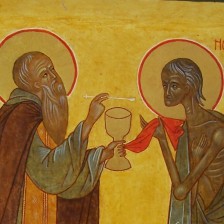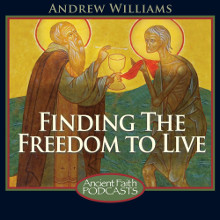
Without freedom, love is impossible. And as I said a couple of weeks ago, without freedom, true repentance is impossible. This is the same thing, of course, because true repentance involves opening ourselves in love of God, a willingness to throw ourselves into the open arms of Christ.
There is a place for force, but that place is only within ourselves. God will not force us into good, and he will not force us to turn to him, however far we fall, and however much we need to turn to him. And the force we practice on ourselves has to be a force borne of love for him, and love for others.
Jesus tells us, “The Kingdom of Heaven suffers violence, and the violent take it by force.” (Mt. 11:12). The path is hard, my soul is weak, and I have to choose to exercise force on myself because deep down, a significant part of me does not want to choose love, does not want to turn over my freedom to God. And yet, even the violence I practise against the passions is not going to win me salvation! That can come only through the grace of God, through union with Christ in his crucifixion and resurrection.
Without freedom, love is impossible Share on X
So my freedom is a double-edged sword. Without freedom, I cannot truly love God or neighbour. Without freedom, I cannot truly repent. Without freedom, I cannot turn myself over to holiness in choosing to be a slave to Christ. But it is also in my freedom that I fall into sin, that I follow my passions… that I make myself a slave to demons. The difference of course is that in becoming a slave to Christ I find perfect freedom, because in union with Christ I can become fully myself, the person I was created to be. But in becoming a slave to demons, although I seem to be following my own desires in my own way, I lose all freedom, and I form myself, in cooperation with the demons, into something much less than a person.
In his book of reminiscences about his time with St Porphyrios, Constantine Yiannitsiotis writes of a time when he had tried to reveal something of his desires to the Elder. He writes that he was “disappointed… and somewhat bitter, because the Elder had not honoured my deep self-analysis with the attention it deserved.” The Elder says, “’you were sitting here and talking to me and telling me all the holy stuff you wanted to do’… ‘What did you see, Elder?’… ‘The opposite… You’ll forgive me… for telling you it so abruptly, but think a lot deeper, look right down into your soul, isn’t what I told you true?’ I prayed silently… ‘Elder, you were right. Those things that I said I wanted can be found on the shiny surface of my soul, but what I feel emerging from the depths, is all dark, sinful, and it terrifies me.’ The Elder added, ‘I saw all of that clearly… Don’t worry; however, it needs a lot of work.'”
Sexual sin is a very clear manifestation of the darkness inside my soul, because it is a particularly clear manifestation of the union my desires move me towards. Some of us who have fallen deeply into sexual sin have seen where it leads… we have been faced with our own destruction — we have seen how seeking union with anything or anyone outside of God gradually takes away our freedom, takes away our personhood, takes away our ability to be uniquely ourselves. The further we fall, the more we are corrupted, the clearer our idolatry becomes. The further we fall, the more we need to exercise that violence, that force against our passions and desires — the dark desires deep in our souls — in order to repent, and yet the further we fall, the less we are able to exercise that force as our freedom to choose is damaged more and more.
Physical sexuality misdirected is an icon of hell Share on XPhysical sexuality is a physical symbol, a physical manifestation of union. In Christian marriage, our physical union with our spouse is to be an icon of our spiritual union with God in Christ. In this union, we see how our love for God and our love for our closest neighbour is one love. But physical sexuality misdirected is an icon of hell! In it, the image, the physical manifestation symbolizes our disintegration. Not only our distance from Christ, as we seek union outside and apart from him, but also our disintegration as persons, as we practise a union with what will never give us true freedom. A union which will never allow us to become truly ourselves, but which will tie us with the demonic.
In any union, we become more and more like those with whom we unite ourselves. In union with God, we become more godly. In union with Christ, we take on the attributes of Christlikeness. This is perfect love, perfect freedom, the ability to be who we are, who we were created to be. In any other union, we begin to lose all those things. Our desires, our freedom, our own selves… these are what lead us to choose any union we enter into. But as we go further and further in, we begin to see: are my desires turning more and more to love? Or are they turning more and more to isolation of myself? Is my freedom growing, enabling me more often to choose the good, to choose love of God and neighbour? Or is my freedom gradually closing down, leading me to seem to have no choice in continuing the path I chose long ago, leading me to addiction and slavery to sin? [norefs]Am I becoming more myself, am I growing in love for God and neighbour? Am I[/norefs] enabled to stand freely even in the face of disapproval from others, in the face of persecution; can I stand for what I believe in even unto death? Or am I losing the strength to be myself; am I becoming conformed to those I have chosen to live among, even when I would rather do otherwise?
I say the Christian life is agreeable and easy, but it requires two preconditions... - St Porphyrios Share on X
Can I see beyond the “shiny surface” of my soul, to the darkness that lurks beneath? Can I be honest with myself about the desires that lie inside? While I have life, there is something of the image of God left in me, however tarnished the likeness to God may be. So while I have life, I still have some freedom left. Can I use that freedom to turn to Christ, to turn away from all demonic desires that will define me if I do not turn away. I can’t do it alone, that is certain; I do not have that sort of strength. I need to turn to the Church, to the mysteries of the Church. I need to confess the darkness in my soul and ask for help. I need to receive Christ in the holy mysteries and to live into holiness by seeking out holy people who will help me, and asking for their prayers and the prayers of the saints. As St Porphyrios said, “It needs a lot of work.” But through that holy work, joy will come, and grace will be given. It is a burden to be yoked to Christ, to be united with him, but as Christ said, “My yoke is easy and my burden is light” (Mt. 11:30). St Porphyrios confirms this too, saying, “Many say that the Christian Life is disagreeable and difficult; I say that it is agreeable and easy, but it requires two preconditions: humility and love.” In what remains of our freedom, can we choose humility and love?


You must be logged in to post a comment.